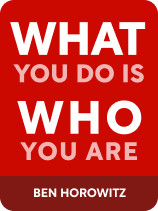

This article is an excerpt from the Shortform book guide to "What You Do Is Who You Are" by Ben Horowitz. Shortform has the world's best summaries and analyses of books you should be reading.
Like this article? Sign up for a free trial here .
How much does your organization’s culture matter? Can it actually determine whether you succeed or fail?
Ben Horowitz argues that organizational culture is paramount to success. He believes that the right culture will boost your business in three ways: by serving the vision, by providing a common purpose, and by combining with a product or service in a way that creates a huge impact.
Keep reading to learn why organizational culture is important.
3 Ways Organizational Culture Boosts Business
Horowitz sees culture as encompassing the actions and decisions of the employees of an organization. All those actions and decisions add up to the organization’s success or failure, which is why organizational culture is important. Horowitz cites three ways culture boosts a business.
First, an intentional culture serves the company’s vision by ensuring that employees know what to do to move the company forward, and they consistently do it.
(Shortform note: While Horowitz argues that a strong culture ensures employees know what to do to move the company forward, culture can also help leaders do the same by aligning everything the company does. Guided by their culture, leaders can create alignment within a company, ensuring that every element reinforces every other element within a company, instead of creating competing forces that slow down progress toward the organization’s vision. In Built to Last, Jim Collins and Jerry Porras argue that to create alignment, you must be able to look at both the big picture and the details to ensure cohesion among all the company’s features.)
Second, Horowitz argues that the right culture can boost individual and company performance by giving employees a common purpose. Successful cultures help employees see that their work matters to the overall mission and that they all direct their daily actions and decisions toward the same goal.
(Shortform note: In Measure What Matters, John Doerr takes this argument further and says that culture is, most of all, a shared sense of purpose. He cites research showing that companies with positive cultures outperform those without them. According to Doerr, this is because a cohesive company culture where everyone understands their purpose helps employees make decisions quickly and reliably.)
Third, Horowitz believes a great culture plus a great product or service is powerful—it can make an impact beyond a single organization and disrupt an industry and an entire system, changing the business landscape forever. He explains that industries develop default modes of behavior that replicate in every new company that comes up in the industry, and they become that industry’s culture. If an organization develops effective new behaviors to deal with the industry’s or system’s challenges, and the product or service the company provides is successful, other companies begin copying the culture in the hopes of being equally successful.
| How Hip-Hop Disrupted the Music and Business Worlds While Horowitz credits hip-hop culture as disrupting the music world, its influence extended even further. Besides spreading the hustler’s mentality in the music industry, it also disrupted the business world by forcing brands and companies from other industries to grapple with hip-hop and with the cultural shifts it brought to the fore. Steve Stoute, the author of The Tanning of America, describes how some companies were able to grow their businesses by embracing the emerging culture while others were less successful. For instance, Adidas was a struggling company in the eighties until hip-hop group RUN DMC put out their song “My Adidas.” Adidas executives took advantage of the opportunity and signed deals with RUN DMC, starting a decades-long relationship between the brand and the hip-hop community. Other brands were less successful. Stoute mentions Cristal, a champagne brand that rappers and hip-hop artists showcased in their music videos to signal their affluent lifestyle. Cristal executives didn’t appreciate the connection to hip-hop, though, and the company said their product wasn’t for that community. The hip-hop community responded by no longer referencing the brand in their music, and Cristal’s market share dropped dramatically, becoming irrelevant to the generations that came after. |
Example: How Intel’s Culture Disrupted Business
Horowitz cites Intel as an example of a culture that disrupted an industry. Bob Noyce, one of Intel’s co-founders, set the tone for Silicon Valley’s culture of innovation. At the time, companies emphasized hierarchy, which stifled innovation because employees only had decision-making power if they climbed the ladder high enough.
Instead, Noyce created a horizontal culture that empowered employees and gave them the freedom to explore new ideas. He got rid of vice presidents and empowered middle managers whom founders would oversee directly. He also made ownership of the company horizontal by giving engineers stock options. This allowed engineers to feel invested enough to nurture and iterate products so they remained innovative. Noyce also emphasized Intel’s horizontal culture through a relaxed dress code and an open office organization. To support the messages implicit in those cultural features, Intel had mandatory meetings on company culture to make their beliefs explicit and ensure that everyone understood them.
Intel’s culture is now a standard in Silicon Valley and beyond. After seeing Intel’s success, companies in other industries and regions adopted its cultural features, from open offices to stock options.(Shortform note: While Intel defined the culture for Silicon Valley, features of Silicon Valley’s innovation culture then spread beyond the tech industry to businesses in general. Some of those features, such as employee ownership and horizontal structures have generally been positive shifts in the business world. Other features, such as open-floor offices and perks, blurred the line between work life and personal life and have become double-edged swords for companies and employees.)

———End of Preview———
Like what you just read? Read the rest of the world's best book summary and analysis of Ben Horowitz's "What You Do Is Who You Are" at Shortform .
Here's what you'll find in our full What You Do Is Who You Are summary :
- The three reasons leaders should care about culture
- How a sense of purpose boosts employees' performance
- What the Samurai and Genghis Khan can teach you about leadership






